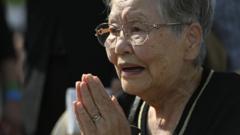As Japan marks 80 years since the atomic bombing of Hiroshima, voices rise anew against nuclear armament and for lasting peace.
Remembering Hiroshima: Eight Decades Since the Atomic Bombing

Remembering Hiroshima: Eight Decades Since the Atomic Bombing
Ceremonies highlight the ongoing call for peace and nuclear disarmament.
On Wednesday morning, Japan paused for reflection, commemorating the 80th anniversary of the atomic bombing of Hiroshima by the United States. The somber ceremony saw attendance from Japanese Prime Minister Shigeru Ishiba and global representatives who gathered at the Peace Memorial Park. "Japan stands alone in having endured an atomic attack," declared Hiroshima's Mayor Kazumi Matsui, emphasizing the nation's quest for enduring peace.
The devastating events, along with the bombings of Nagasaki, culminated in Japan's surrender and the conclusion of World War II, resulting in over 200,000 casualties—many succumbing to the initial blast or subsequent radiation exposure. Survivors continue to recount their harrowing tales, with Shingo Naito, a long-time resident, sharing his father's tragic story of suffering and loss.
As homage is paid to the past, a new generation engages in remembering the tragedies by transforming survivor testimonies into art. In a hopeful turn, atomic bomb survivors' group Nihon Hidankyo was recognized with the Nobel Peace Prize in 2024 for its dedication toward eliminating nuclear weapons globally.
Mayor Matsui cautioned against the "concerning trend of military escalation" worldwide, urging action to prevent a regression from established peace agreements, particularly the nuclear Non-Proliferation Treaty, which he claimed is on the verge of collapse. He also advocated for Japan's ratification of the Treaty on the Prohibition of Nuclear Weapons, enacted in 2021, aimed at banning nuclear arms—a treaty opposed by leading nuclear states like the US and Russia, which cite the deterrent necessity of their arsenals.
Public dissent against nuclear weapons continues within Japan, with demonstrations occurring near the memorial site. Atomic bomb survivor Saitoshi Tanaka evoked visceral memories of destruction as he drew parallels between his experience and today's conflicts, such as those in Gaza and Ukraine. "We coexist with nuclear weapons capable of annihilating humankind," he expressed, urging the global populace to intensify their demands for nuclear disarmament and to compel leaders of nuclear states to prioritize peace.
The devastating events, along with the bombings of Nagasaki, culminated in Japan's surrender and the conclusion of World War II, resulting in over 200,000 casualties—many succumbing to the initial blast or subsequent radiation exposure. Survivors continue to recount their harrowing tales, with Shingo Naito, a long-time resident, sharing his father's tragic story of suffering and loss.
As homage is paid to the past, a new generation engages in remembering the tragedies by transforming survivor testimonies into art. In a hopeful turn, atomic bomb survivors' group Nihon Hidankyo was recognized with the Nobel Peace Prize in 2024 for its dedication toward eliminating nuclear weapons globally.
Mayor Matsui cautioned against the "concerning trend of military escalation" worldwide, urging action to prevent a regression from established peace agreements, particularly the nuclear Non-Proliferation Treaty, which he claimed is on the verge of collapse. He also advocated for Japan's ratification of the Treaty on the Prohibition of Nuclear Weapons, enacted in 2021, aimed at banning nuclear arms—a treaty opposed by leading nuclear states like the US and Russia, which cite the deterrent necessity of their arsenals.
Public dissent against nuclear weapons continues within Japan, with demonstrations occurring near the memorial site. Atomic bomb survivor Saitoshi Tanaka evoked visceral memories of destruction as he drew parallels between his experience and today's conflicts, such as those in Gaza and Ukraine. "We coexist with nuclear weapons capable of annihilating humankind," he expressed, urging the global populace to intensify their demands for nuclear disarmament and to compel leaders of nuclear states to prioritize peace.



















